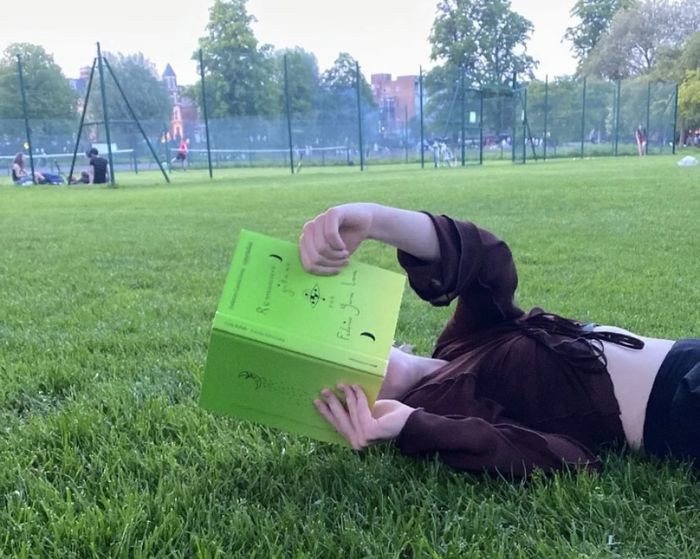Poet and you don’t even know it: write poems, not essays
Whatever your degree, your refuge from that essay deadline is just one stanza away, writes Heather Leigh

I get it — your list of due essays is longer than your arm, and writing for pleasure might have fallen very much by the wayside. But creative writing can be a refreshing counterpoint to the demands of your degree, and I am yet to be convinced that there is any situation which poetry cannot improve. From the serious to the silly, in love or in heartbreak, in joy or in grief, it is remarkable what words on a page can achieve. Poetry is personal. Poetry is political. Poetry is specific. Poetry is universal. Poetry is whatever you want it to be. Or, perhaps more accurately, poetry is whatever you need it to be. (*pauses, gets off soapbox*)
“Poetry invites you to condense your thoughts and feelings onto the page”
Seriously though, poetry is the answer. Proven to reduce stress and anxiety, provide comfort when you need it most, and with an incredible capacity to uplift, putting pen to paper is an age-old therapeutic practice. Romantic poet John Clare and modernist author Sylvia Plath are among the many writers who used poetry to cope in difficult times, and American poet Mary Oliver claimed that verse is a “life-cherishing force”. You may not be going through crises of quite the same scale as Clare and Plath, but you can still reap the benefits offered by a hearty dose of poetic catharsis.
Writing poetry gives you space to express yourself, release pent-up emotion and reflect on experiences in the same way that journalling does, but as a distilled literary form it invites you to condense your thoughts and feelings onto the page, clarifying the essence of whatever you’re trying to process. And aside from the therapeutic advantages, writing poetry is fun, creative and a rewarding way to use your literary panache for something other than a 5,000-word dissertation.
A couple of years ago I attended a creative writing course at Ted Hughes’ old home, Lumb Bank, where I met Roy McFarlane, former Birmingham Poet Laureate and current National Canal Laureate. For him, “poetry is a safe space to be vulnerable, to be exceptional, to be a witness, to be a voice for the voiceless and always a compass to our humanity.”
“Your voice is just as valid as the next person’s”
Poetry brings you into a community which transcends temporal and physical distance — you’re connected with people who feel the same way you do, reminding you that you’re not alone, and you’re connected with people who feel differently to you, expanding your vision of the world. In the preface to Lyrical Ballads, Wordsworth famously claims that poetry “takes its origin from emotion recollected in tranquillity,” while Wendy Cope argues that “poetry is emotion recollected in a highly emotional state”. However you go about it, your voice is just as valid as the next person’s, and you can be as playful or as philosophical as you like.
You might end up discovering a new talent, but you don’t need to be the next Shakespeare to enjoy the imaginative freedom that poetry offers. If you’re not sure how to start, or if you’re on the hunt for new inspiration, use the prompts below to get your creative juices flowing:
- Christina Rosetti’s ′Sonnets are full of love’ voices her appreciation for her mother, weaving a “wreath of rhymes wherewith to crown [her] honoured name,” while Sienna Black’s poem ‘Self-portrait as the colours of my hometown’ (from this year’s The Mays) bears testament to the love she feels for her older brother. Choose someone special in your life and use their wonderfulness to inspire your words.
- Coined by Terrance Hayes, a ‘golden shovel’ is a verse form which spells out another poem through the last words of each line — look at ’We Real Cool’ and ′The Golden Shovel’ to see how Hayes digs up and replants the words of Gwendolyn Brooks. Create your own variation on the golden shovel form by picking a short quote that’s meaningful to you (it could be a line of poetry, a song lyric, or a personal mantra) and writing a poem in which the last word of each line recreates this phrase.
- If you’re enjoying having a structured container to pour your poem into, try your hand at a shape poem, where the lines are arranged on the page to visually replicate the poetic subject. If you’re feeling adventurous you could aim for a complicated shape, as in John Hollander’s ′Swan and Shadow’, or you can take a more experimental approach like E.E. Cummings’ ′r-p-o-p-h-e-s-s-a-g-r’, where the letters are jumbled as if a grasshopper has leapt across the page.
- Feeling bougie and meta? Create art about art — the options are endless. You could take inspiration from a film (as Nina Mingya Powles did with her poem ′Girl warrior, or: watching Mulan (1998) in Chinese with English subtitles’, a painting (such as Lee Stockdale’s ′Standing in Awe at the Museum of Modern Art’) or a piece of music (as in Wendy Cope’s ′A Green Song’ which recycles the tune of ‘Ten Green Bottles’).
- For a shorter exercise, pick a vowel and write a poem where every word includes that vowel. Or write a poem from the perspective of an object — what would your uni fridge say if it could talk? Or that neglected glass of water that’s been on your bedside table since 2014?
Whether you prefer to write first thing in the morning or late at night, outside in the fresh air or inside with no distractions, in a Sidge-girlie leatherbound book or on the notes app of your phone, make poetry your own. There’s no wrong way to go about it, so do as the mighty Natasha Bedingfield tells you and “release your inhibitions”. Or, as Roy McFarlane puts it: “Write your story, write what excites you, write with a freedom”.
 News / Eight Cambridge researchers awarded €17m in ERC research grants27 December 2025
News / Eight Cambridge researchers awarded €17m in ERC research grants27 December 2025 News / Downing investigates ‘mysterious’ underground burial vault 29 December 2025
News / Downing investigates ‘mysterious’ underground burial vault 29 December 2025 Lifestyle / Ask Auntie Alice29 December 2025
Lifestyle / Ask Auntie Alice29 December 2025 Sport / Hard work, heartbreak and hope: international gymnast Maddie Marshall’s journey 29 December 2025
Sport / Hard work, heartbreak and hope: international gymnast Maddie Marshall’s journey 29 December 2025 Interviews / Meet Juan Michel, Cambridge’s multilingual musician29 December 2025
Interviews / Meet Juan Michel, Cambridge’s multilingual musician29 December 2025










